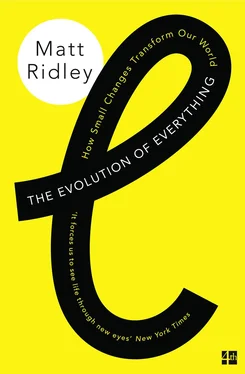The way that human history is taught can therefore mislead, because it places far too much emphasis on design, direction and planning, and far too little on evolution. Thus, it seems that generals win battles; politicians run countries; scientists discover truths; artists create genres; inventors make breakthroughs; teachers shape minds; philosophers change minds; priests teach morality; businessmen lead businesses; conspirators cause crises; gods make morality. Not just individuals, but institutions too: Goldman Sachs, the Communist Party, the Catholic Church, Al Qaeda – these are said to shape the world.
That’s the way I was taught. I now think it is more often wrong than right. Individuals can make a difference, of course, and so can political parties or big companies. Leadership still matters. But if there is one dominant myth about the world, one huge mistake we all make, one blind spot, it is that we all go around assuming the world is much more of a planned place than it is. As a result, again and again we mistake cause for effect; we blame the sailing boat for the wind, or credit the bystander with causing the event. A battle is won, so a general must have won it (not the malaria epidemic that debilitated the enemy army); a child learns, so a teacher must have taught her (not the books, peers and curiosity that the teacher helped her find); a species is saved, so a conservationist must have saved it (not the invention of fertiliser which cut the amount of land needed to feed the population); an invention is made, so an inventor must have invented it (not the inexorable, inevitable ripeness of the next technological step); a crisis occurs, so we see a conspiracy (and not a cock-up). We describe the world as if people and institutions were always in charge, when often they are not. As Nassim Taleb remarks in his book Antifragile , in a complex world the very notion of ‘cause’ is suspect: ‘another reason to ignore newspapers with their constant supply of causes for things’.
Taleb is brutally dismissive of what he mockingly calls the Soviet-Harvard illusion, which he defines as lecturing birds on flight and thinking that the lecture caused their skill at flying. Adam Smith was no less rude about what he called the man of system, who imagines ‘that he can arrange the different members of a great society with as much ease as the hand arranges the different pieces upon a chess-board’, without considering that on the great chessboard of human society, the pieces have a motion of their own.
To use a word coined by Abraham Lincoln, I hope gradually to ‘disenthrall’ you over the course of this book, from the obsession with human intentionality, design and planning. I want to do for every aspect of the human world a little bit of what Charles Darwin did for biology, and get you to see past the illusion of design, to see the emergent, unplanned, inexorable and beautiful process of change that lies underneath.
I have often noticed that human beings are surprisingly bad at explaining their own world. If an anthropologist from Alpha Centauri were to arrive here and ask some penetrating questions, he would get no good answers. Why is the homicide rate falling all around the world? Criminologists cannot agree. Why is global average income more than ten times what it was in the nineteenth century? Economic historians are divided. Why did some Africans start to invent cumulative technology and civilisation around 200,000 years ago? Anthropologists do not know. How does the world economy work? Economists pretend to explain, but they cannot really do so in any detail.
These phenomena belong in a strange category, first defined in 1767 by a Scottish army chaplain by the name of Adam Ferguson: they are the result of human action, but not of human design. They are evolutionary phenomena, in the original meaning of the word – they unfold. And evolutionary phenomena such as these are everywhere and in everything. Yet we fail to recognise this category. Our language and our thought divide the world into two kinds of things – those designed and made by people, and natural phenomena with no order or function. The economist Russ Roberts once pointed out that we have no word to encompass such phenomena. The umbrella that keeps you dry in a shower of rain is the result of both human action and human design, whereas the rainstorm that soaks you when you forget it is neither. But what about the system that enables a local shop to sell you an umbrella, or the word umbrella itself, or the etiquette that demands that you tilt your umbrella to one side to let another pedestrian pass? These – markets, language, customs – made things. But none of them is designed by a human being. They all emerged unplanned.
We transfer this thinking back into our understanding of the natural world too. We see purposeful design in nature, rather than emergent evolution. We look for hierarchy in the genome, for a ‘self’ in the brain, and for free will in the mind. We latch on to any excuse to blame an extreme weather event on human agency – whether witchdoctoring or man-made global warming.
Far more than we like to admit, the world is to a remarkable extent a self-organising, self-changing place. Patterns emerge, trends evolve. Skeins of geese form Vs in the sky without meaning to, termites build cathedrals without architects, bees make hexagonal honeycombs without instruction, brains take shape without brain-makers, learning can happen without teaching, political events are shaped by history rather than vice versa. The genome has no master gene, the brain has no command centre, the English language has no director, the economy has no chief executive, society has no president, the common law has no chief justice, the climate has no control knob, history has no five-star general.
In society, people are the victims and even the immediate agents of change, but more often than not the causes are elsewhere – they are emergent, collective, inexorable forces. The most powerful of these inexorable forces is biological evolution by natural selection itself, but there are other, simpler forms of evolutionary, unplanned change. Indeed, to borrow a phrase from a theorist of innovation, Richard Webb, Darwinism is the ‘special theory of evolution’; there’s a general theory of evolution too, and it applies to much more than biology. It applies to society, money, technology, language, law, culture, music, violence, history, education, politics, God, morality. The general theory says that things do not stay the same; they change gradually but inexorably; they show ‘path dependence’; they show descent with modification; they show trial and error; they show selective persistence. And human beings none the less take credit for this process of endogenous change as if it was directed from above.
This truth continues to elude most intellectuals on the left as well as the right, who remain in effect ‘creationists’. The obsession with which those on the right resist Charles Darwin’s insight – that the complexity of nature does not imply a designer – matches the obsession with which those on the left resist Adam Smith’s insight – that the complexity of society does not imply a planner. In the pages that follow, I shall take on this creationism in all its forms.
1 CONTENTS Cover Title Page How Small Changes Transform Our World Copyright Prologue: The General Theory of Evolution 1. The Evolution of the Universe 2. The Evolution of Morality 3. The Evolution of Life 4. The Evolution of Genes 5. The Evolution of Culture 6. The Evolution of the Economy 7. The Evolution of Technology 8. The Evolution of the Mind 9. The Evolution of Personality 10. The Evolution of Education 11. The Evolution of Population 12. The Evolution of Leadership 13. The Evolution of Government 14. The Evolution of Religion 15. The Evolution of Money 16. The Evolution of the Internet Epilogue: The Evolution of the Future Footnotes Sources and Further Reading Index Acknowledgements By the Same Author About the Publisher
Читать дальше












